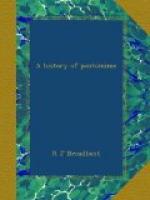However, the church was not always against the stage, even in those early times, as St. Thomas Aquinas says that “The office of the player as being serviceable for the enlivenment of men, and as not being blameworthy if the player leads an upright life.” Both Saints Thomas Aquinas and Anthony supported the stage, the latter only stipulating that the character of Harlequin should not be represented by a clergyman, nor that Punch should be exhibited in church.
It is one of the most remarkable things that, despite the bitterness, hostility, and deadly enmity that has been levelled at the stage, and its players termed “Rogues and Vagabonds” from time immemorial, how it has lived through it all. In connection with this how the lines of that great actor, Vandenhoff, occurs to me, a few of which, with the reader’s permission, I subjoin.
“The drama’s now
a great established fact,
That can’t be blink’d,
ignored how’er attack’d
By vain abuse or angry prejudice;
The time’s gone by when
playing was a vice;
When bigots mark’d the
actor with a ban,
(Tho’ saintly crowds
to hear his accents ran),
Denied him sacred rite and
hallowed grave—
Filching from God the soul
he made to save—
And, for the pleasure which
his life had giv’n
On earth, refused him dead,
a place in heav’n.
No! wiser days bring gentler
feelings in,
And ’Nature’s
touches makes the whole world kin’.”
By degrees the Mimis, or mummers, with their fellows, spread themselves all over Europe. The humbler of the craft, in fact it might be said of them all, as Othello’s occupation had (for them) long since been gone, strolled from castle to castle, from village to town, and earning their livelihood as best they could. To these wandering Bohemians we owe such traditions of the drama that survived with them into succeeding ages; and to them also we are indebted for keeping alive by inculcating unto others the Art of Pantomimus, when in the heyday of its popularity in the Roman Empire.
CHAPTER VIII.
Pantomime in the English Mystery or Miracle Plays and Pageants—A retrospect of the Early Drama—Mysteries on Biblical events—Chester, Coventry, York, and Towneley Mystery Plays—Plays in Churches—Traces of the Mystery Play in England in the Nineteenth Century—Mystery Plays on the Continent—The Chester series of Plays—The Devil or Clown and the Exodiarii and Emboliariae of the Ancient Mimes.
It is presumed that, not only were the early sacred plays acted in dumb-show, but that the Miracle or Mysteries of Religion series of plays—which grew out of the sacred play—also the Pageants in the beginning, and for long afterwards were acted in this wise. Percy, in his “Reliques of Ancient English Poetry,” also takes this view. He says:—“They were (the Mysteries)




